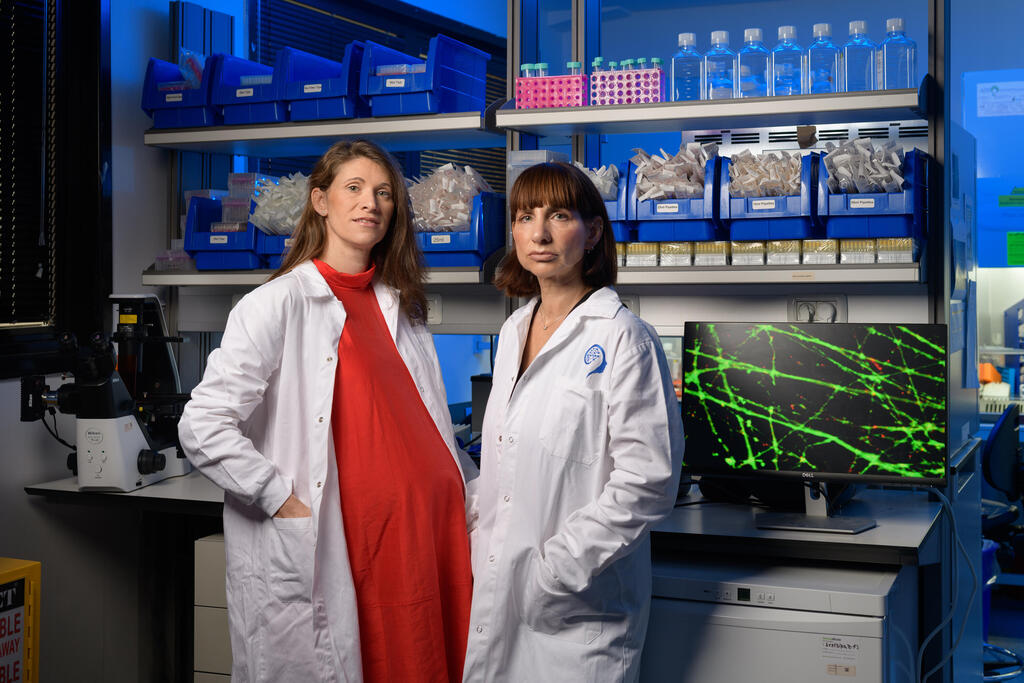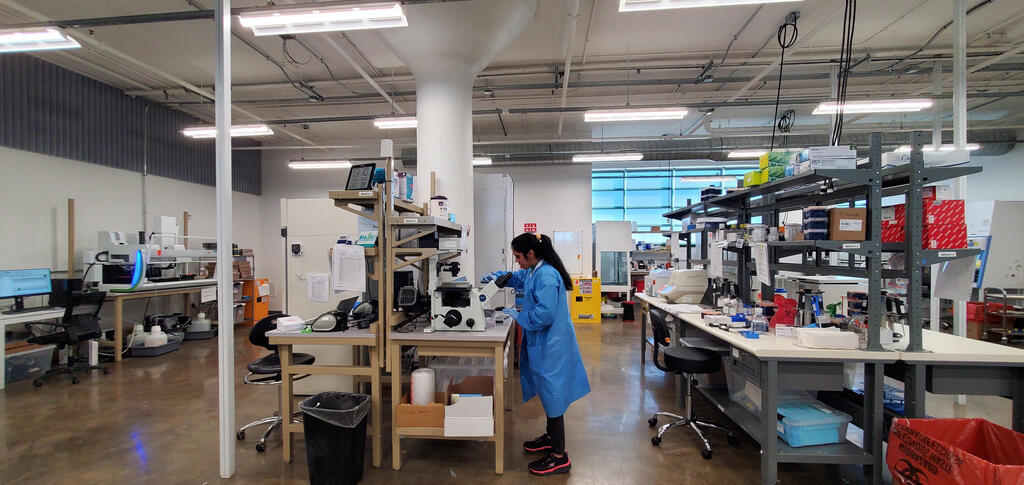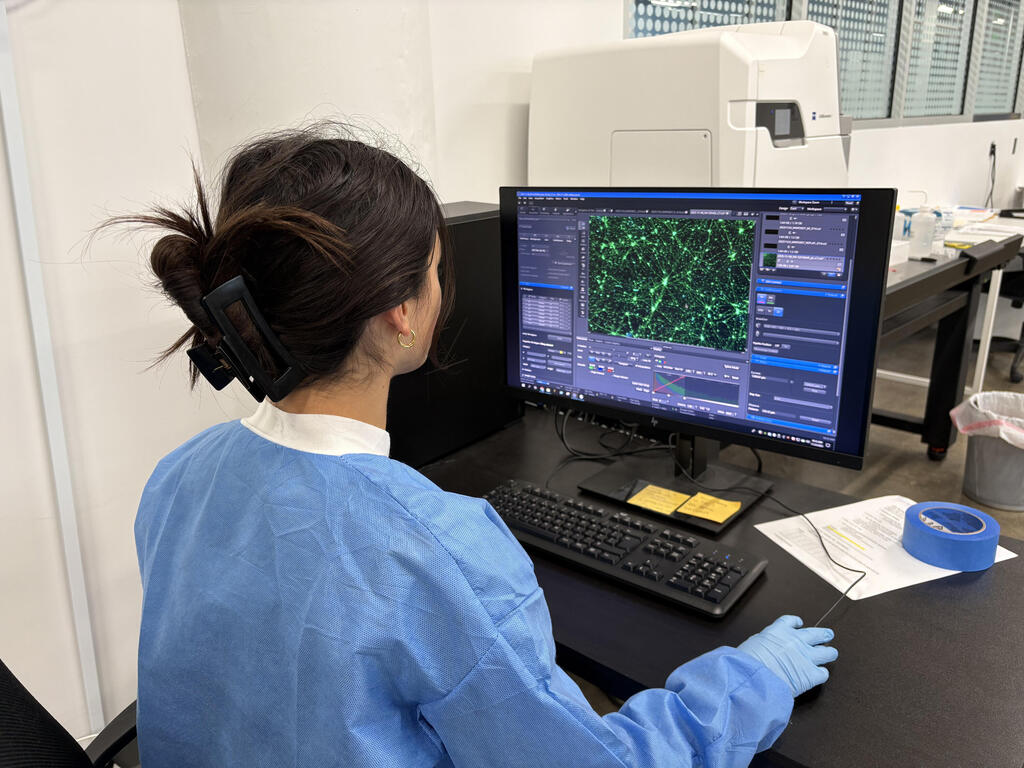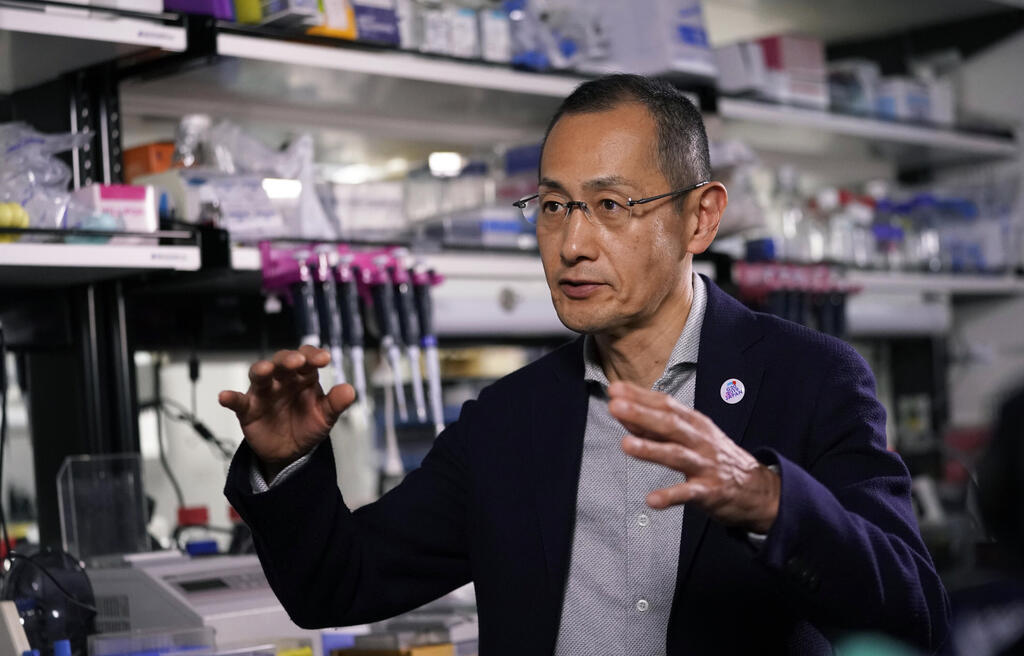NeuroKaire’s offices on Yigal Alon Street in Tel Aviv are about as far as one can get from the gleaming workspaces of a typical Israeli high-tech company. The parking lot is dark and dirty, the elevator creaks, and there is no doorman, nor a sea view, unlike the surrounding luxury towers. The surprise begins only after stepping through the wide office doors: giant microscopes, highly sophisticated robots, and some of the world’s most advanced medical equipment, all enabling one of the most complex biological feats in existence, turning ordinary blood cells into human brain cells.
“We could have been, like all the other startups, in one of the high-tech towers in the area, but they simply wouldn’t let us bring in all our equipment,” say Dr. Talia Cohen Solal and Dr. Daphna Laifenfeld, explaining the practical reason for choosing the second floor of a drab building. There is another, equally pragmatic reason that suits the company’s largely “feminine” profile: NeuroKaire’s 30-person team consists mostly of women with advanced degrees in biology and chemistry, many of them new immigrants. “Obviously, the towers around us are shiny,” Cohen Solal says. “But it was also important to us not to spend money on things we didn’t need. The location mattered too, early on, one of us lived in Jerusalem and the other in Haifa. Tel Aviv, near the train station, was simply the midpoint.”
4 View gallery


Dr. Talia Cohen Solal and Dr. Daphna Laifenfeld.
(Photo: Yonatan Bloom)
Only after these logistical explanations do Cohen Solal and Laifenfeld turn to the company’s groundbreaking technology, and it is genuinely astonishing. NeuroKaire, founded in 2018, has developed a system that creates a kind of “brain-in-a-dish,” currently used to rapidly match antidepressants to patients using only a simple blood sample. This capability is already being deployed in several HMOs in Israel. In July, it reached a major milestone when it was approved for use in the United States through Medicare and Medicaid, a development with far-reaching implications for the company’s future.
The concept may sound straightforward, but anyone who has taken antidepressants, or knows someone who has, understands how revolutionary this is. One of the central challenges in treating depression, a disease that affects at least half a billion people worldwide and is a leading cause of death among teenagers, is the time it takes to identify the right medication. Roughly 70 antidepressants exist in the Western world, but physicians have no reliable way to predict which one will work for a particular patient. Because these medications do not provide immediate relief, they must be taken for at least four weeks before doctors can assess their effectiveness. It is a long and often discouraging process: not only may a drug fail entirely, but patients can also experience significant side effects, dizziness, weight gain, or deepening despair, during the trial period. Many ultimately abandon treatment. Studies show it takes, on average, 12 to 18 months for a psychiatrist to find an effective medication for a given patient. That prolonged journey raises healthcare costs, strains psychiatric services, and increases the risk of patients deteriorating.
NeuroKaire’s test dramatically shortens this ordeal. A patient provides a routine blood sample, and the company’s technology converts those blood cells into the patient’s own brain cells. In the laboratory, these cells are then exposed simultaneously to every available antidepressant to determine which will be most effective, and which will cause the fewest side effects. After roughly 40 days, the clinician receives a detailed report ranking the most suitable medications. The patient avoids the lengthy guesswork, and the likelihood of a successful outcome increases sharply.
How, though, can a laboratory determine whether a drug will work inside someone’s brain?
Laifenfeld explains: “The blood samples arrive at our laboratories in New Jersey. There, incubators prepare sterile brain-cell cultures. Then we examine them under a special microscope, it looks like a giant printer but costs half a million dollars.”
And can a microscope really reveal different responses from drug to drug or from person to person? Can depression be seen?
“What underlies depressive disorders is a breakdown in communication between neurons,” she says. “Neurons communicate through electrical and chemical signals, and we can measure the improvement in that communication. When neurons are exposed to an effective drug, we see increased connectivity and a return to healthy communication patterns.”
4 View gallery


NeuroKaire lab.
(Phoot: NeuroKaire)
“When Talia told me about this technology, I was amazed”
CEO Dr. Talia Cohen Solal (42), who at the time of the interview was just days away from giving birth to her third child, leads the research efforts at NeuroKaire. Dr. Daphna Laifenfeld (53), a mother of four, serves as Chief Strategy Officer and oversees the company’s business operations. The two first met at industry meet-ups, the kind of high-tech networking events that usually end with nothing more than a cocktail and a polite conversation. But the event they attended, which focused on the status of women in tech, ended up being life-changing. They spoke briefly about developments in psychology and neurology, their respective fields, but when Laifenfeld saw Cohen Solal’s excitement about the possibility of turning ordinary blood cells into brain cells, her curiosity was instantly sparked.
Cohen Solal grew up in Britain, moved to the United States during her doctoral studies at Columbia University, and immigrated to Israel after marrying an Israeli she met while studying. Laifenfeld, originally from Haifa, also returned from many years of research in the U.S., including a postdoctoral fellowship at Harvard University. While Cohen Solal had spent years focused purely on research, Laifenfeld specialized in the business side of medicine, particularly in personalized medicine. She was recruited to Teva by Prof. Michael Hayden, a world-renowned scientist and then the company’s second-in-command. But Teva’s turmoil in 2016 forced her to reassess her future.
“It was a very difficult time at Teva. Thousands of employees were laid off, and I realized that even though I kept my job, I wouldn’t have the budget to develop the personalized medicine field I had been hired to build,” Laifenfeld recalls. “Then I met Talia, who told me about this amazing technology, that you can turn blood cells into brain cells to create a mirror of the brain, and I was amazed. I reacted exactly the way people react today when they hear about this technology for the first time.”
Their chance meeting led to the breakthrough they now call “brain-in-a-dish,” a technology that brings together their two areas of expertise: brain-cell research derived from ordinary blood cells, applied to personalized medicine.
The foundation of the technology, Cohen Solal explains, lies in a discovery by Japanese scientist Shinya Yamanaka, winner of the 2012 Nobel Prize. His groundbreaking research showed that adult cells, contrary to long-held belief, can be reprogrammed into stem cells. Stem cells, primordial cells formed in the fetus, have not yet differentiated into specific tissues and can therefore become any type of cell in the human body. They are essential for treating diseases requiring bone-marrow transplants, and today cord-blood banks around the world preserve them. Yamanaka’s discovery that stem cells can be created from adult blood cells dramatically simplified the field.
Cohen Solal and Laifenfeld pushed that principle even further. NeuroKaire first transforms blood cells into stem cells, and then transforms them again into brain cells. Their technology and patents have drawn global recognition and attracted to the company’s advisory board the world-renowned psychiatrist and researcher Prof. Stephen Stahl, author of one of the most influential psychopharmacology textbooks. Together with him, Cohen Solal and Laifenfeld published a pivotal scientific paper this year on innovations in depression treatment, focusing on personalized medicine.
4 View gallery


NeuroKaire lab.
(NeuroKaire)
How do you reach the pinnacle of neurological research before age 40?
“Unfortunately, at a very early age, I had to cope with family members who suffered from mental illness,” Cohen Solal says. “I learned to understand the intricacies of that world, and it drew me to neurology. That’s what I studied at Oxford, and from there I went on to do a doctorate at UCL.” She completed her doctorate at 28 but still felt she didn’t understand the brain deeply enough. “At UCL I could choose from among 613 brain labs, because I was in a special program for outstanding students that allowed me to do whatever I wanted. But for me it was like fulfilling one of the 613 mitzvot, because what I wanted was to help the world of mental health.
“After my doctorate, I spent five years at Columbia University as a postdoctoral fellow, working in some of the most advanced stem-cell labs in the world. I worked at Memorial Sloan Kettering, where I helped develop a treatment for Parkinson’s using neurons produced from stem cells. I also explored whether schizophrenia could be treated this way. But the goal there was always to develop one drug for everyone. At the same time, I saw wealthy donors giving enormous sums so we could study very specific diseases that affected them or their children. That pushed me to realize that in neurology and psychiatry, conditions are often highly individual. Our brains are all built differently, so the drugs cannot be one-size-fits-all like Tylenol.”
At 33, after meeting her future husband, Cohen Solal moved to Israel, a place that was not entirely unfamiliar. “My grandparents immigrated here after the Six-Day War. I spent every summer in Israel with them, but since I’m from England and they came from the U.S., we always spoke English. To this day, I don’t speak Hebrew properly,” she says, explaining why the interview is conducted in English.
Like Cohen Solal, Laifenfeld was always drawn to mental health. She began a bachelor’s degree in psychology at the University of Haifa but soon felt it wasn’t scientific enough and shifted toward medical research, ultimately completing a doctorate at the Technion with a focus on depression. She then went on to a postdoctoral fellowship at Harvard. “I was there for two years and I hated every minute,” she says. “The science was incredible, and it’s amazing what you can do with the huge budgets these institutions have. But I felt like a tiny cog doing nothing meaningful, and it frustrated me.”
Laifenfeld remained in the U.S. for several more years, working in pharmaceutical companies. She later joined Teva to help expand personalized medicine beyond oncology, where it has become nearly standard. “I recognized in Talia’s idea something parallel to oncology,” she says, “because what our blood test does is essentially a kind of brain biopsy, and that’s what enables the most precise tailoring of drugs based on the type and behavior of the tissue.”
4 View gallery


Japanese scientist Shinya Yamanaka.
(Photo: Shizuo Kambayashi/AP)
“Everyone has their own depressive concert”
The collaboration between the two founders took off, and NeuroKaire began its journey in a shared startup workspace at the Hebrew University called BioGiv. After a short period, they concluded that the idea was indeed feasible and set out independently. So far, they have raised $25 million: $2 million in Seed funding, a $3 million grant from the European Union’s prestigious Horizon program and the Israel Innovation Authority, and two funding rounds of $10 million each.
Venture capital funds are typically reluctant to invest in technologies that take years to mature into applied solutions, and as a result, NeuroKaire did not experience a rush of investors. The second $10 million round was led by Boston-based Greybird Ventures, with only one Israeli fund, Meron Capital, participating. Now, after receiving regulatory approvals and insurance coverage for their expensive test, which costs about $600, Cohen Solal and Laifenfeld are focused on rebuilding the company and shifting it from a research entity to a commercial one. This requires hiring marketing and sales staff, primarily in the United States, as well as additional employees for the test-decoding laboratory in New Jersey, which currently has only six workers. “In order to build the company’s new structure and prepare it for commercialization, we will soon launch another round of capital raising,” they say.
The company currently has no revenue, but Laifenfeld estimates that once the tests are included in broad U.S. insurance plans, they will be able to sell about 2,000 tests per quarter by next year. Within five years, as they expand the range of conditions for which their tests can match patients to the right medication, annual sales could reach $100 million. Most revenue will come from U.S. insurance companies that cover the test; in Israel, coverage comes from the supplementary insurance programs of Clalit and Meuhedet.
The company’s success ultimately depends on whether doctors will adopt the test or whether they will continue relying on the familiar trial-and-error process. After all, in most cases patients manage with Cipralex or Prozac, even if they experience side effects.
Cohen Solal: “That’s true. Antidepressants are prescribed mainly by family doctors, not psychiatrists, and they generally stick to about four drugs they know well. For most of them, the choice of medication isn’t based on scientific reasoning, it’s simply the drug they prefer. They prescribe it, wait six to twelve weeks to see whether it works at different doses, and if it doesn’t, or if the side effects are too severe, they move on to the next drug. According to field data, in 67% of cases the first antidepressant prescribed does not work. By contrast, the results of our test, which includes all existing drugs, will allow doctors to discover medications they’ve never prescribed before. By the end of the year, we will shorten the turnaround time for results from eight weeks to six, and by 2027 the cost will also drop by 50% because the patent on Yamanaka’s technology for transforming adult cells into stem cells will expire. And we should remember that from the insurers’ standpoint, the average cost of trial and error in matching a patient with the right drug is about $7,000, so the cost of our test no longer looks so high.”
From your experience so far, have you seen significant differences between patients? Or does it turn out that the popular drugs also tend to work for everyone?
“This was exactly the question Stephen Stahl asked us before he joined the company,” Cohen Solal says. “But all the reports we’ve received show significant differences, and no report resembles another. Moreover, we’ve received feedback from doctors that medications ranked low in our reports truly had no effect on the specific patient.”
Do you have a hypothesis about what drives the differences between people? Is it the type of depression, the causes, personality, or brain structure?
“This is obviously a research question that preoccupies us, and if we find the answer, we’ll probably receive a Nobel Prize,” Cohen Solal replies with a smile. “I’ve spent 12 years trying to understand the brain and the unique concert each person creates, but we still don’t fully understand the differences. What we have managed to do is build a model of your brain and provide an answer to your specific symphony of depression. Studies show that a tendency toward depression is partly genetic, but there are also acquired traits. If you grew up with a depressed mother, that will affect how your brain is ‘wired’ during adolescence. It’s also well known that there are different types of depression, so the perception today is that, like cancer, depression treatment is highly suited to personalized medicine. Psychiatry may become the second-largest field after oncology in this emerging industry.”
“Antidepressants are just our first stop”
Depression is a very common illness, but in Israel at the end of 2025 it has become a particularly acute problem, following years of social upheaval and a prolonged war. A recent survey by the State Comptroller’s Office found that about a third of respondents reported moderate or severe post-traumatic stress or depressive symptoms, and about a fifth reported anxiety symptoms. In other words, nearly a million people in the country suffer from some form of depression or anxiety, and because of the extraordinary burden on the mental-health system, the waiting time for treatment in the HMOs now exceeds six months.
Most Israeli medical startups ignore the local market and focus primarily on the United States and Europe. But you have also introduced your test to Israeli health insurance companies. Is that related to the rise in depression and post-traumatic stress disorder since the war?
Laifenfeld: “Under our agreements with the HMOs, 75% of Israelis will receive coverage for the test. That was very important to us, especially given the current situation, but also because we expected doctors in Israel to adopt it quickly. Israel has a unique culture of rapid adoption of innovation and far less reluctance than many other places. From our perspective, the very fact that we were able to bring our test into the health system is extremely exciting.”
Is it possible to expand your tests to match medications for post-trauma as well?
“Neural connectivity underlies most mental illnesses, and post-trauma is also expressed through disruptions in communication between neurons in the brain. The main developments in this field today involve psychedelic drugs, which affect neuronal connectivity and are therefore being studied both for depression and for post-trauma, although none of them have been approved yet by the FDA. We also examined ketamine treatment as part of a collaboration with the Israeli startup Clexio, which is developing it as a treatment for post-trauma, and we saw that we can distinguish and analyze ketamine’s effect on patients suffering from it.”
What about competition? Surely someone has tried to tailor antidepressants to patients before.
Laifenfeld: “There have been attempts to perform metabolic tests or, alternatively, to give patients EEG tests. But metabolic tests only reflect how patients metabolize the medications and how long the drugs remain in their bodies. From those results, you can only draw certain conclusions about side effects. An EEG, on the other hand, is a complex test that measures electrical activity in the brain and requires the patient to be connected to electrodes, which is very different from a simple blood test. And ultimately, an EEG can tell you whether the patient suffers from depression and needs medication, but it cannot tell you which medication they should take.”
If the test is so successful, what are your chances of remaining an independent company in a pharma market dominated by large players?
“There are companies in this market that generate $150 million in revenue from similar tests and remain independent. We don’t intend to stay a company that only matches antidepressants, that’s just our first stop, because it’s the largest market, worth $6 billion a year. Using the same blood-based method, it will be possible to match treatments for anxiety disorders and attention deficit hyperactivity disorder (ADHD), and those are the two areas we will enter next year. Anxiety disorders represent a $1.8 billion market, and ADHD another $2.5 billion. Together with Alzheimer’s, schizophrenia, Parkinson’s, bipolar disorder and multiple sclerosis, the broader ‘brain-in-a-dish’ field reaches $20 billion, a huge blue ocean for us.”
